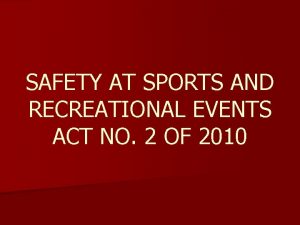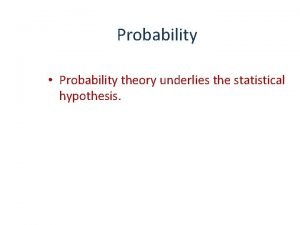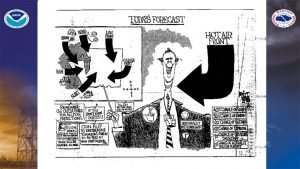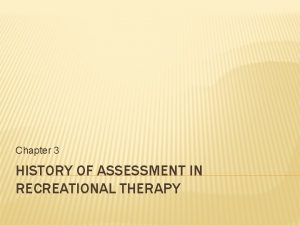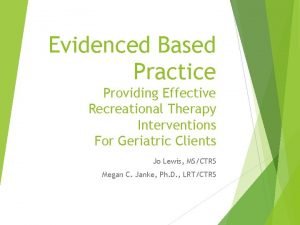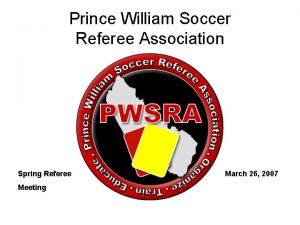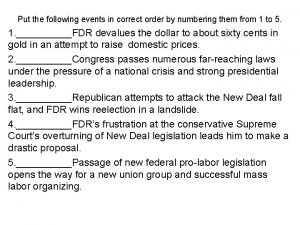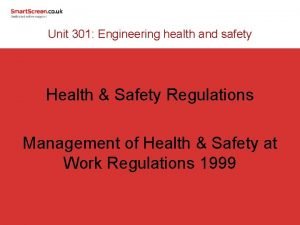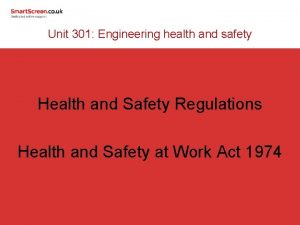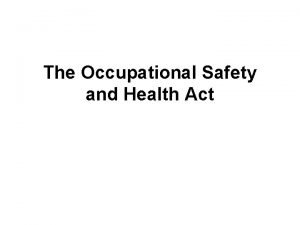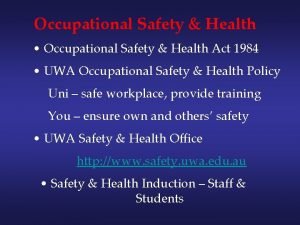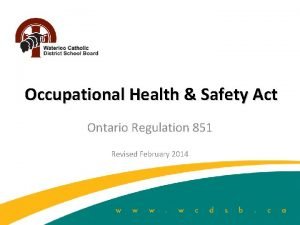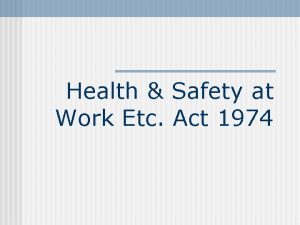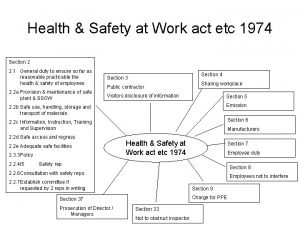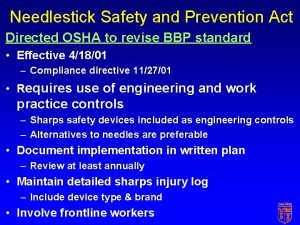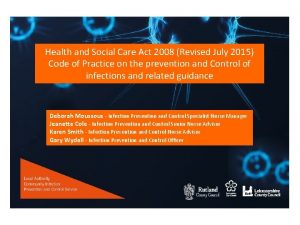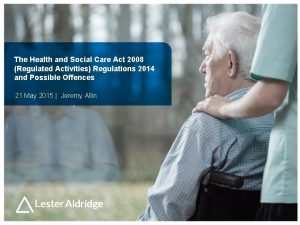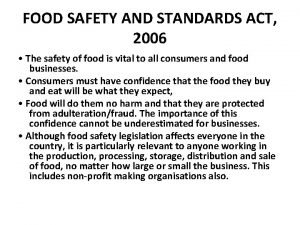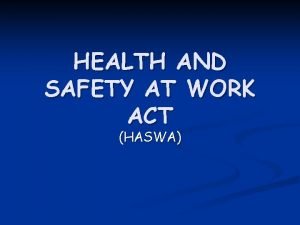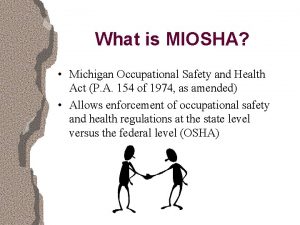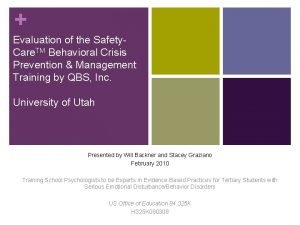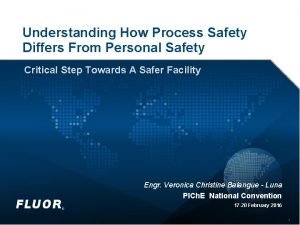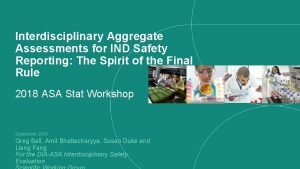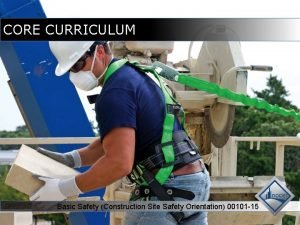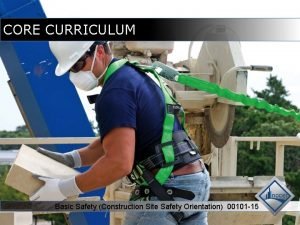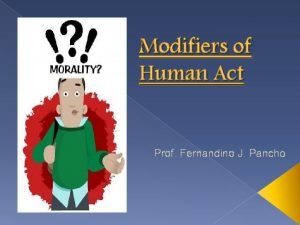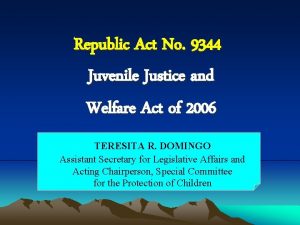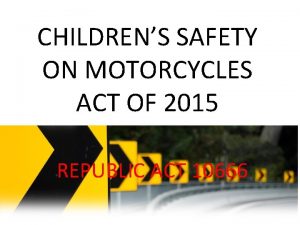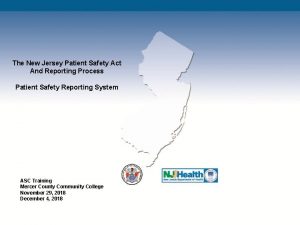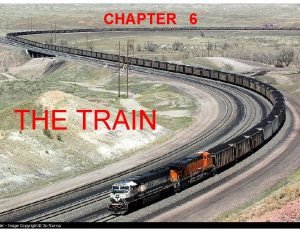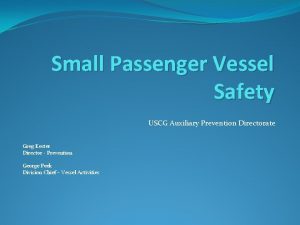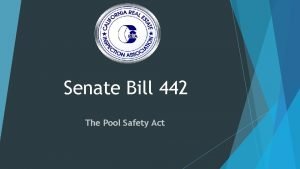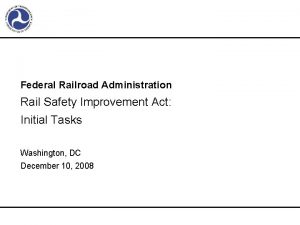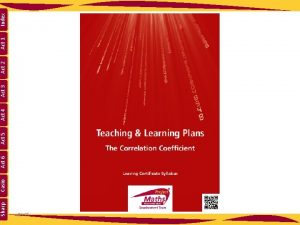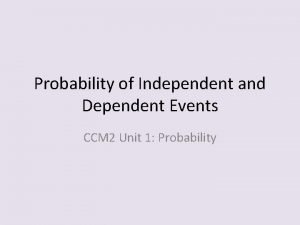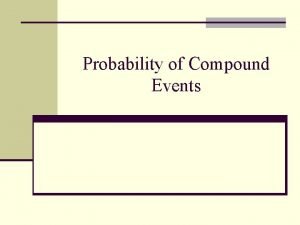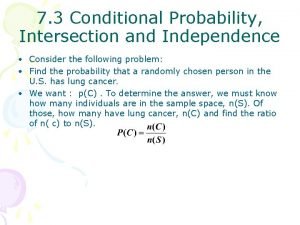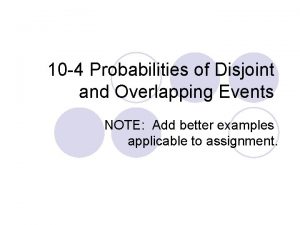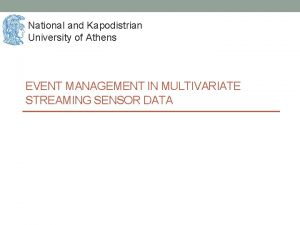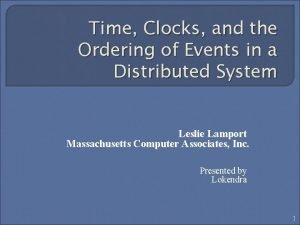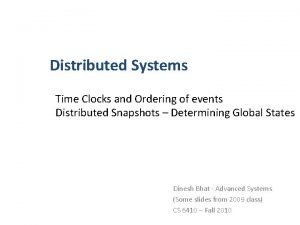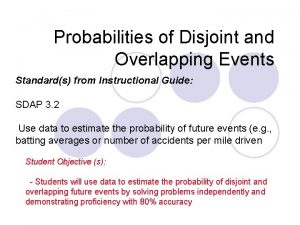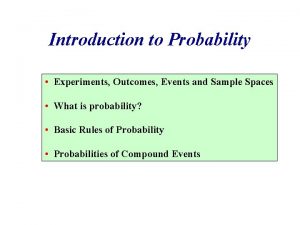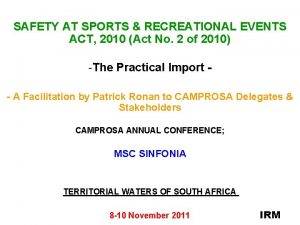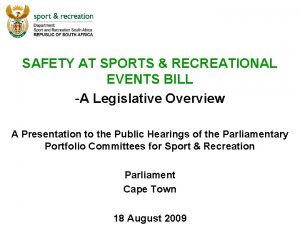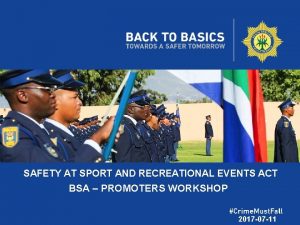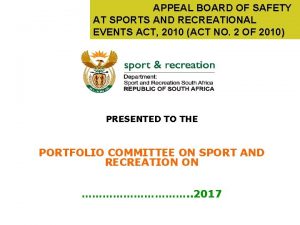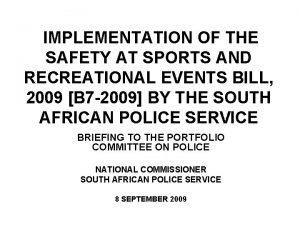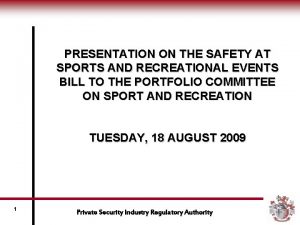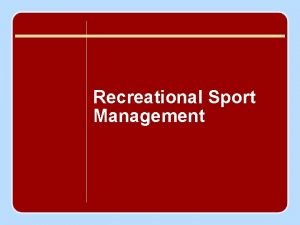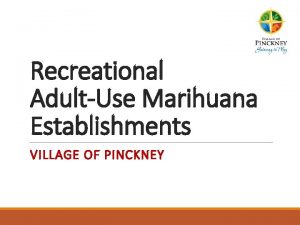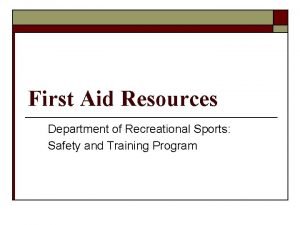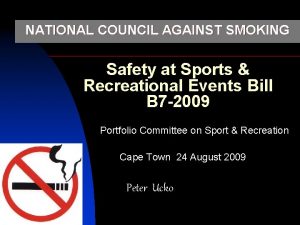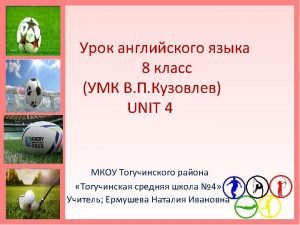SAFETY AT SPORTS AND RECREATIONAL EVENTS ACT NO




























































































- Slides: 92

SAFETY AT SPORTS AND RECREATIONAL EVENTS ACT NO. 2 OF 2010

COMMENCEMENT n ASSENTED TO ON 24 MAY 2010. n COMMENCED ON 2 AUGUST 2010. n PROMULGATED BY PROCLAMATION NO. 40 AS PUBLISHED IN GOVERNMENT GAZETTE 33438 OF 3 AUGUST 2010.

BACKGROUND 11 April 2001. Chiefs vs Pirates. Ellis Park, Johannesburg. 43 Dead, 158 injured.

BACKGROUND

BACKGROUND Commission of Enquiry. Judge B M Ngoepe. 14 Reasons for disaster. Several recommendations.

PURPOSE TO PROMOTE AND PROTECT THE PHYSICAL WELL-BEING AND SAFETY OF ALL PERSONS ATTENDING EVENTS AS WELL AS THE SAFETY OF THEIR PROPERTY.

DEFINITIONS AUTHORISED MEMBER: A police official designated as Chairperson of an event safety and security planning committee and who has overall authority to direct measures relating to safety and security at an event. (Section 15)

DEFINITIONS EVENT SAFETY AND SECURITY PLANNING COMMITTEE: The committee responsible for coordinating the functions of the role-players that are involved in the provision of safety and security at an event, the planning for the event, the assignment of tasks, the demarcation of areas and zones and to advise the National Commissioner on the categorisation of an event. (Section 15)

DEFINITIONS EVENT: Any sporting, entertainment, recreational, religious, cultural, exhibitional, organisational or similar activities hosted at a stadium, venue or along a route or within their respective precincts.

DEFINITIONS STADIUM: An enclosed or semi-enclosed structure which consists of seating for spectators and a field of play or a permanent or temporary podium or other area within the structure reserved for the purposes of hosting events, which have a safe seated or standing spectator capacity of at least 2 000 people.

DEFINITIONS VENUE: Any area or place, other than a stadium, that has a seating or standing capacity of at least 2 000 persons, within which other structures may be erected and which may be demarcated by an enclosed or semi-enclosed permanent or temporary structure.

DEFINITIONS ROUTE: The way or course taken in getting from a starting point to a destination during an event that takes the form of a race or procession.

DEFINITIONS EVENT ORGANISER: Any person who plans, is in charge of, manages, supervises or holds an event or sponsorship rights to an event or in any manner controls or has a material interest in the hosting of an event.

DEFINITIONS EMERGENCY SERVICES: All public and private sector medical services, including emergency medical and health services, the fire department, the disaster management department and local authority traffic or by-law enforcement department.

DEFINITIONS ESSENTIAL SERVICES: A department of state or other administrative unit, such as a disaster management centre and those departments responsible for electrical, water, sewerage and waste removal utilities in the administration of a local authority.

DEFINITIONS SAFETY OFFICER: A person appointed by the organiser to assist with the planning and oversight of safety and security measures at an event.

DEFINITIONS VOC: A venue operations centre where the entire safety and security operation in respect of an event at a stadium, venue or along a route is coordinated.

DEFINITIONS VOC COMMANDER: The authorised member of the South African Police Service who is in charge of the VOC or police official designated to be in charge of the VOC.

DEFINITIONS MINISTER: The Minister responsible for sport and recreation in the Republic.

APPLICATION OF ACT This act does not apply to gatherings as defined in the Regulation of Gatherings Act, 1993 (Act No. 205 of 1993).

PROHIBITION No person may organise an event unless that person: n Has provided the National Commissioner with an event schedule; AND n Has taken out public liability insurance from a registered or authorised person in terms of applicable insurance legislation.

EXEMPTIONS The Minister may on application: n Exempt any area or any event or any class or category of such events by notice in the Government Gazette from the operation of any or all provisions of this act; or n Exempt a person from compliance with any or all provisions of the act by notice in writing addressed to such person.

RISK CATEGORISATION OF EVENTS An event organiser must, at least six months before the start of a calendar year or before the start of a season, submit an annual schedule of events to the National Commissioner. Sufficient particulars and any prescribed information must be contained in the schedule of events.

RISK CATEGORISATION OF EVENTS Provision is made for events that were unforeseen at the time when the schedule of events was submitted. Upon initiating plans for the unforeseen event, the organiser must submit an event schedule to the National Commissioner.

RISK CATEGORISATION OF EVENTS If sufficient particulars and information are supplied, the National Commissioner is obliged to make a risk categorisation for each event contained in the schedule. There a host of prescribed factors to be taken into account and the National commissioner may consult with any person.

RISK CATEGORISATION OF EVENTS Each event contained in the schedule of events must be categorised as being either a low-risk, medium-risk or high-risk event. The organiser and local authority in whose jurisdiction the event will take place, must be informed in writing of the category assigned to all events by the National Commissioner.

SAFETY CERTIFICATES Local authority issues safety certificates for: Existing stadiums or venues; - The design of a new stadium or venue; and - Alterations of or extensions to a stadium or venue. -

SAFETY CERTIFICATES A safety certificate must be accompanied by a grading certificate issued by the local authority. A grading certificate must state: The determined safe spectator capacity; and - The level of risk of the event that may be hosted at a stadium or venue. -

SAFETY CERTIFICATES A local authority may only issue a grading certificate for a high risk event after consultation with the authorised member.

SAFETY CERTIFICATES In the case of a high-risk event the National Commissioner issues the high-risk event safety certificate. The organiser must apply for such a certificate at least 60 days before the event.

RESPONSIBILITY : ORGANISER Put in place such measures as may be prescribed to ensure the physical safety and security of persons and their property at an event. Must cooperate with and assist the event safety and security planning committee and the VOC commander in the performance of their functions.

RESPONSIBILITY : ORGANISER Appoint sufficient persons to be responsible for safety and security at an event, including a safety officer, security officers and such other persons as may be prescribed.

RESPONSIBILITY : ORGANISER Appoint stewards responsible for: n The marshalling and overseeing of the safe general flow of spectators; n Provision of event information to spectators; n Provision of ushering services; and n Provision of assistance with emergency evacuation procedures to spectators.

RESPONSIBILITY : ORGANISER May appoint volunteers to provide any function or service in support of an event. Stewards and volunteers are not allowed to provide security services, unless they are registered as security officers.

RESPONSIBILITY : ORGANISER In the event of a low-risk event, the organiser must be at least 21 years old. In the case of a medium-risk or high-risk event, the organiser must be at least 21 years old AND have the necessary capacity, resources and event-related experience to organise the event.

RESPONSIBILITY : ORGANISER In case of a low-risk event, the organiser must ensure that: n A safety officer is appointed; n A written safety plan is prepared; n Measures are put in place to give effect to the safety plan; and n Ensure that the local police station is informed of the event details prior to the event.

RESPONSIBILITY : ORGANISER The written safety plan must provide the following detail of the event: n n n Safety measures; Security measures; Crowd management measures; Motor vehicle parking arrangements; and Emergency medical measures.

RESPONSIBILITY : NATIONAL COMMISSIONER The National Commissioner: n May direct an organiser to implement such additional measures as may be necessary; n Must establish an event safety and security planning committee for each medium-risk or high-risk event; n Must appoint a VOC commander; n May prohibit the sale of event tickets at the stadium or venue on the day of the event;

RESPONSIBILITY : NATIONAL COMMISSIONER n May stipulate conditions to be included in a high-risk event safety certificate; n May amend or replace a safety certificate; n May prohibit or restrict the admission of a person or a group of persons by issuing a prohibition notice; and n May issue a spectator exclusion notice with regard to an undesirable spectator.

AUTHORISED MEMBER The National Commissioner must designate a police official with at least the rank of Captain as authorised member. The designation must be in writing and can be either in general or for a specific event. The official must be suitably qualified and experienced in event policing matters.

AUTHORISED MEMBER It is the responsibility of the authorised member to establish the event safety and security planning committee for each medium-risk and high-risk event.

AUTHORISED MEMBER The authorised member: n Is the Chairperson of the event SASPC; n Appoints the members of the event SASPC; n Manages and coordinates the powers and duties of the event SASPC; and n Has overall authority to direct measures relating to safety and security at the event.

EVENT SAFETY AND SECURITY PLANNING COMMITTEE The committee consists of: n Persons designated and authorised by the following role players: - The National Commissioner or an authorised member; - A local authority disaster management department; - A controlling body (high-risk only); - A stadium or venue owner;

EVENT SAFETY AND SECURITY PLANNING COMMITTEE - The event organiser; An emergency service provider; A health and medical service provider acting in terms of the National Health Act; A security service of the State; and A provincial health department.

EVENT SAFETY AND SECURITY PLANNING COMMITTEE n. A - representative of: A security service provider; A person that an authorised member considers necessary; and Volunteers (where applicable)

EVENT SAFETY AND SECURITY PLANNING COMMITTEE The existence of an event safety and security planning committee does not limit the accountability and liability of an organiser to ensure safety and security, including the deployment of adequate personnel for security, safety, health and sanitation purposes.

EVENT SAFETY AND SECURITY PLANNING COMMITTEE Duties of committee: - Consider the categorisation of the event; - Prepare the event-specific safety and security plan providing for the coordination of all involved in the provisioning of safety and security at the event: - Assigns specific tasks to specific persons;

EVENT SAFETY AND SECURITY PLANNING COMMITTEE Determine specific event prescribed measures relating to a host of factors; - Demarcate restricted areas at the event; - Demarcate a zone as exclusive zone with regard to commercial activities; and - Advise the event organiser on protection and safeguarding issues. -

EVENT SAFETY AND SECURITY PLANNING COMMITTEE In the case of a high-risk event, the eventspecific safety and security plan must be submitted to the National Commissioner for written approval at least 60 days before the event.

EVENT SAFETY AND SECURITY PLANNING COMMITTEE In the case of a medium-risk or high-risk event, the committee must submit the details of a security service provider or security officers employed to the Private Security Industry Regulatory Authority in order to ensure compliance with applicable legislation.

VENUE OPERATIONS CENTRE (VOC) Where a medium-risk or high-risk event is held at a stadium or venue, the stadium or venue owner must establish the prescribed VOC. In the case of such an event being held along a route, the event organiser is responsible to establish the VOC.

VENUE OPERATIONS CENTRE (VOC) The event safety and security planning committee may on application or of its own accord approve the use of an alternative, temporary or mobile VOC. The committee could also decide that a VOC is not necessary for an event.

VENUE OPERATIONS CENTRE (VOC) It is the responsibility of the authorised member to determine which role-players or representatives of role-players are to staff the VOC for the duration of the event.

VENUE OPERATIONS CENTRE (VOC) The VOC commander is the authorised member, OR A suitably qualified police official designated by the authorised member, who has experience in event policing matters, with at least the rank of Captain.

VENUE OPERATIONS CENTRE (VOC) Responsibilities of VOC Commander: Ensure written plan is prepared; - In case of high-risk event that the plan is approved by the National Commissioner; and - Distribute the plan to role-players in VOC 30 days before event. -

ACCREDITATION An event organiser or the stadium or venue owner is responsible for the accreditation of any person in the prescribed manner. The accreditation of any person must be done in consultation with the event safety and security planning committee.

ACCREDITATION The event organiser must ensure that every entry point of a designated area is clearly identified. At every entry point a notice must indicate that the area is limited to persons specifically accredited to enter that area.

ACCREDITATION Section 18(4) - It is a crime to enter a designated area without being accredited to enter such an area. Upon conviction can be sentenced to a fine or imprisonment for six months or both.

ACCREDITATION - An access control officer may: Request any person entering or in a designated area to produce accreditation; Refuse any person without accreditation entry to the designated area; and Remove any person without accreditation from a designated area.

ACCREDITATION The Minister of Police may prescribe the process to be followed in respect of accreditation and the physical features and information that have to be incorporated within accreditation cards.

EVENT TICKETING The total number of tickets available must not exceed the safe spectator capacity of a stadium or venue as determined by a local authority. The National Commissioner may prohibit the sale of event tickets at a stadium or venue on the day of the event.

EVENT TICKETING If the sale of tickets is permitted on the day of a high-risk event, such sale must be conducted: - At least one kilometre from the stadium or venue; or - At a location determined by the event safety and security planning committee.

EVENT TICKETING The Minister of Police may prescribe any matter relating to event ticketing relating to safety and security at events. The Act requires that an event ticket must at a minimum contain certain information.

EVENT TICKETING - Minimum information on tickets: Name of area where event will be hosted, including the name of stadium or venue; Nature of the event; Date, day and time of event; Layout plan of stadium or venue with spectator orientation information; and Conditions of entry to the event.

EVENT TICKETING

SPECTATOR AND VEHICLE ACCESS An organiser may appoint: - A security officer as an access control officer for control of access of people and motor vehicles; and - Peace officers to be in charge of searches and seizures.

SPECTATOR AND VEHICLE ACCESS Any person entering a stadium or venue and any motor vehicle or container in the possession or under the control of such a person may be searched by a peace officer for any prescribed prohibited or restricted objects or substances. Any prescribed prohibited or restricted objects or substances found, may be seized and dealt with in the prescribed manner.

SPECTATOR AND VEHICLE ACCESS A person entering or found inside a stadium or venue may be requested to: - Produce and open for inspection any bag container or item in his or her possession; Submit to being searched; Be screened by an electronic search and scanning device; and Allow his belongings, including a motor vehicle, to be screened by physical or electronic scanning devices.

SPECTATOR AND VEHICLE ACCESS A person: Who refuses to comply with a search request; or - Appears to be intoxicated or under the influence of a prohibited substance; - may be refused entry to or directed to leave the stadium or venue.

SPECTATOR AND VEHICLE ACCESS The organiser must ensure that every entry point to a traffic-free zone is clearly identified and have a notice that access to that zone is limited to a person and a motor vehicle specifically accredited to enter it. No motor vehicle is allowed to enter a traffic-free zone without the necessary accreditation.

SPECTATOR AND VEHICLE ACCESS An owner or driver of a vehicle found in a traffic-free zone without accreditation, may be ordered by an access control officer to remove that vehicle. If the owner or driver is not readily available, the vehicle can be removed and impounded by a police official or peace officer and the owner shall bear the costs of such a removal and impoundment.

SPECTATOR AND VEHICLE ACCESS The Minister of Police may prescribe measures necessary to control spectator and vehicle access at events.

PROHIBITION NOTICES In the situation where the admission of spectators involves a serious risk to any person at the event, a prescribed prohibition notice may be issued which prohibits or restricts the admission of spectators. The prohibition notice is issued by the National Commissioner or authorised member after consultation with the event safety and security planning committee.

SPECTATOR EXCLUSION NOTICES If the National Commissioner, event safety and security planning committee, authorised member or VOC commander has reason to believe that there is a threat the attendance of a person or group of persons may result in the disruption of the event or injury to a person or damage to property, a spectator exclusion notice may be issued by the authorised member or VOC commander.

SPECTATOR EXCLUSION NOTICES The Minister of Police may prescribe factors that must be taken into account in deciding whether the attendance of a person or group of persons is regarded as undesirable.

APPEAL BOARD An independent Appeal Board is established to hear and decide upon appeals against decisions made in terms of this Act. Any person not satisfied with a decision may lodge a written appeal within 14 days. Any decision taken will stay in place until the Appeal Board has made a ruling.

OFFENCES AND PENALTIES The Act creates a number of offences and penalties. It is not possible in this presentation to deal with each and everyone. Therefore only certain offences will be highlighted. The offences can be found in Section 44 and it is recommended that you familiarize yourself therewith.

OFFENCES AND PENALTIES Section 44(1)(a) – To organise an event without providing the National Commissioner with an event schedule and/or without public liability insurance. A fine or imprisonment for a period not exceeding 20 years or both.

OFFENCES AND PENALTIES Section 44(1)(b) – An organiser not putting measures in place to ensure safety or not appointing sufficient persons responsible for safety or not appointing stewards. A fine or imprisonment for a period not exceeding 20 years or both.

OFFENCES AND PENALTIES Section 44(1)(c) – For commercial purpose resell, dispose of or promote event tickets, use a ticket for advertising, sales or promotional purposes or selling complimentary tickets without prior written authorisation from organiser. A fine or imprisonment for a period not exceeding 10 years or both.

OFFENCES AND PENALTIES Section 44(1)(l) – Contravening an event ticket condition or written conditions of entry into a stadium or venue or route. A fine or imprisonment for a period not exceeding 5 years or both.

OFFENCES AND PENALTIES Section 44 (1)(m) – Being in possession of a prohibited or restricted object or substance within a stadium or venue or along a route. A fine or imprisonment for a period not exceeding 10 years or both.

OFFENCES AND PENALTIES Section 44(1)(n) – Hinders, interferes with or obstructs a police official, a private security service provider, an access control officer, a peace officer, etc. A fine or imprisonment for a period not exceeding 20 years or both.

OFFENCES AND PENALTIES Section 44(1)(o) – Hinder, interferes with or obstructs an authorised member or VOC commander in the execution of his duties. A fine or imprisonment for a period not exceeding 10 years or both.

OFFENCES AND PENALTIES Section 44(1)(p) – Throwing anything towards the field of play or at other spectators. A fine or imprisonment for a period not exceeding 10 years or both.

OFFENCES AND PENALTIES Section 44(1)(q) – Damages or destroys any movable or immovable property inside a stadium or venue or along a route. A fine or imprisonment for a period not exceeding 10 years or both.

OFFENCES AND PENALTIES Section 44(1)(r) – Engages in delinquent and anti-social behaviour, including engaging in racist, vulgar, inflammatory, intimidating or obscene language or behaviour. A fine or imprisonment for a period not exceeding 10 years or both.

OFFENCES AND PENALTIES Section 44(1)(s) and (u) – Entering any designated area without the necessary accreditation or parking in a traffic-free zone without the necessary accreditation. A fine or imprisonment for a period not exceeding 10 years or both.

REGULATIONS The Minister of Police is authorised to make regulations regarding matters related to safety and security, including but not limited to; - Information in respect of planned events; The powers of police officials at events; Functioning and monitoring of the VOC; All matters related to accreditation; and The control of vendors at events.

DELEGATION The National Commissioner may delegate any of his powers or duties to any police official of the rank of Captain or above. Despite such a delegation, the National Commissioner is not divested of any power or duty so delegated.

LIMITATION OF LIABILITY - The following is not personally liable in respect of any act or omission performed in good faith: Minister of Police; Person acting in terms of authority of Minister of Police; National Commissioner or authorised member; and Person acting under direction of National Commissioner or authorised member.

CLOSING Thank you to everybody for your time and attendance. Travel safely and enjoy the rest of your day.
 Safety at sports and recreational events act
Safety at sports and recreational events act Indoor and outdoor sports examples
Indoor and outdoor sports examples Recreational activities across cultures and genders
Recreational activities across cultures and genders Mutually exclusive events vs not mutually exclusive events
Mutually exclusive events vs not mutually exclusive events Recreational activities definition
Recreational activities definition Duality in linguistics
Duality in linguistics Recreational activities objectives
Recreational activities objectives Mt rainier recreational forecast
Mt rainier recreational forecast Spectator type of recreational activities
Spectator type of recreational activities Recreation therapy assessment tools
Recreation therapy assessment tools Metaxalone coupon
Metaxalone coupon How to use recreational dive planner
How to use recreational dive planner What is duplo and karagatan in philippine literature
What is duplo and karagatan in philippine literature Motivation for recreational participation
Motivation for recreational participation What exception if any permits a private pilot
What exception if any permits a private pilot Prince william soccer club
Prince william soccer club Doxepin recreational
Doxepin recreational Macbeth act 3-5 summary
Macbeth act 3-5 summary Flipchart on safety practices and sports injury management
Flipchart on safety practices and sports injury management Learn from patient safety events
Learn from patient safety events Language
Language What is this
What is this Put the following actions in order
Put the following actions in order Hamlet act 3 events leading to climax
Hamlet act 3 events leading to climax Unit 301
Unit 301 Health and safety regulations in engineering
Health and safety regulations in engineering Williams-steiger occupational safety and health act of 1970
Williams-steiger occupational safety and health act of 1970 Occupational safety and health act 1984
Occupational safety and health act 1984 Occupational health and safety act ontario
Occupational health and safety act ontario Health and safety at work act 1974 section 2
Health and safety at work act 1974 section 2 Health and safety at work act
Health and safety at work act Needlestick safety and prevention act
Needlestick safety and prevention act Child protection and toy safety act
Child protection and toy safety act Health and social care act 2008
Health and social care act 2008 Work health and safety regulations 2012 sa
Work health and safety regulations 2012 sa Health and social care act regulated activities
Health and social care act regulated activities Health and safety at work act 1984
Health and safety at work act 1984 Food safety 2006
Food safety 2006 What is haswa
What is haswa Miosha respiratory protection
Miosha respiratory protection Catzoc ecdis definition
Catzoc ecdis definition Safety care behavioral safety training
Safety care behavioral safety training Personal safety vs process safety
Personal safety vs process safety Ind safety report
Ind safety report 00101-15 basic safety
00101-15 basic safety 00101-15 basic safety
00101-15 basic safety Fear in human acts
Fear in human acts R.a 9344
R.a 9344 Ra 10666
Ra 10666 Nj patient safety act
Nj patient safety act Safety appliance act 1893
Safety appliance act 1893 Passenger vessel safety act of 1993
Passenger vessel safety act of 1993 California swimming pool safety act 1998
California swimming pool safety act 1998 Rail safety improvement act of 2008
Rail safety improvement act of 2008 Canadian motor vehicle safety standards
Canadian motor vehicle safety standards Act 1 scene 1 othello summary
Act 1 scene 1 othello summary Macbeth summary of act 1
Macbeth summary of act 1 Voluntariness in ethics
Voluntariness in ethics Title act interior design
Title act interior design Act 120 training
Act 120 training S a t c quadrants
S a t c quadrants Act 6 act 5
Act 6 act 5 Unit circle satc
Unit circle satc Punic wars who fought
Punic wars who fought Romeo and juliet timeline day by day
Romeo and juliet timeline day by day Identify independent and dependent events
Identify independent and dependent events Simple event and compound event
Simple event and compound event A school survey found that 9 out of 10 students like pizza
A school survey found that 9 out of 10 students like pizza Recurring characteristics or events
Recurring characteristics or events Independent vs dependant events
Independent vs dependant events Mutually exclusive events examples with solutions
Mutually exclusive events examples with solutions Pros and cons of gagne's nine events of instruction
Pros and cons of gagne's nine events of instruction Review exercise terms and events answer key
Review exercise terms and events answer key Cellular events of acute inflammation
Cellular events of acute inflammation Dependent events and conditional probability
Dependent events and conditional probability Overlapping events examples
Overlapping events examples Whatis a short story
Whatis a short story Time clocks and the ordering of events
Time clocks and the ordering of events The great gatsby chapter 3 questions
The great gatsby chapter 3 questions Expressive speech act
Expressive speech act National and kapodistrian university of athens events
National and kapodistrian university of athens events Time clocks and the ordering of events
Time clocks and the ordering of events What are mutually inclusive events
What are mutually inclusive events The events and complications begin to resolve themselves
The events and complications begin to resolve themselves Leslie lamport time clocks
Leslie lamport time clocks Written and other recorded events of people
Written and other recorded events of people Example of mutually inclusive events
Example of mutually inclusive events 10-7 independent and dependent events
10-7 independent and dependent events Significant life events health and social care
Significant life events health and social care Overlapping events examples
Overlapping events examples Sample space and events
Sample space and events Experimental outcomes
Experimental outcomes Brainpop independent and dependent events answers
Brainpop independent and dependent events answers
